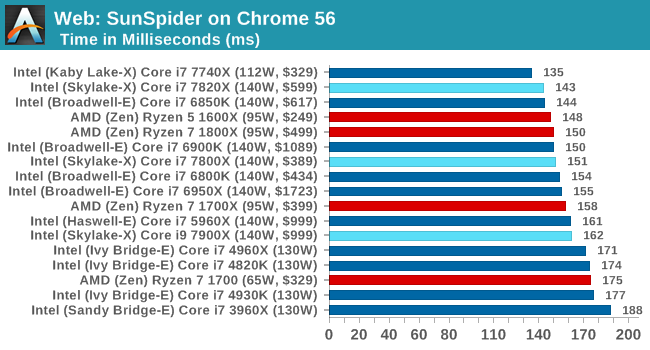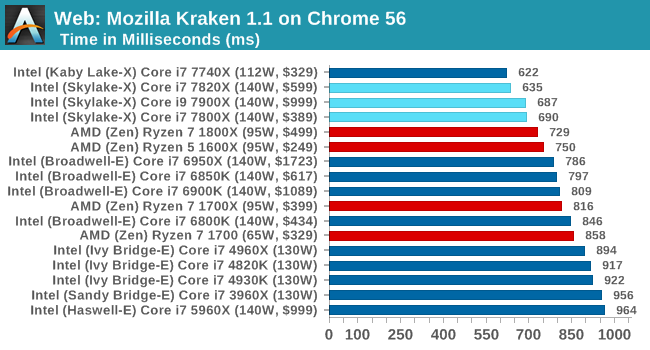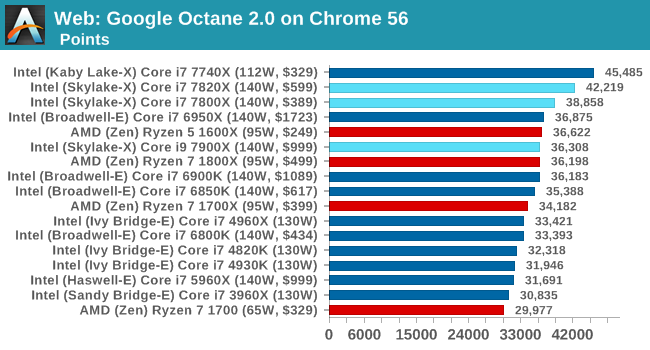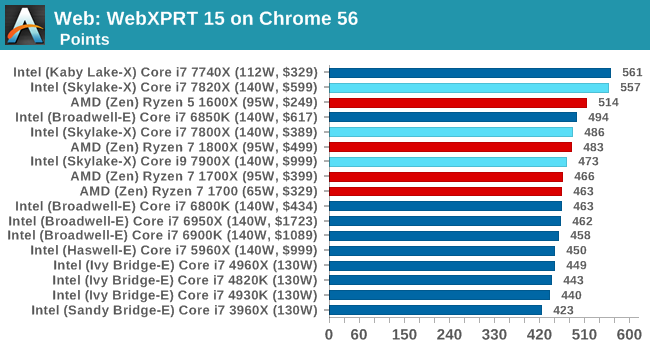The Intel Skylake-X Review: Core i9 7900X, i7 7820X and i7 7800X Tested
by Ian Cutress on June 19, 2017 9:01 AM ESTBenchmarking Performance: CPU Web Tests
One of the issues when running web-based tests is the nature of modern browsers to automatically install updates. This means any sustained period of benchmarking will invariably fall foul of the 'it's updated beyond the state of comparison' rule, especially when browsers will update if you give them half a second to think about it. Despite this, we were able to find a series of commands to create an un-updatable version of Chrome 56 for our 2017 test suite. While this means we might not be on the bleeding edge of the latest browser, it makes the scores between CPUs comparable.
SunSpider 1.0.2
The oldest web-based benchmark in this portion of our test is SunSpider. This is a very basic javascript algorithm tool, and ends up being more a measure of IPC and latency than anything else, with most high-performance CPUs scoring around about the same. The basic test is looped 10 times and the average taken. We run the basic test 4 times.

Sunspider goes after peak frequency most of the time, althoguh there is some variation as it moves into basically becoming a legacy test.
Mozilla Kraken 1.1
Kraken is another Javascript based benchmark, using the same test harness as SunSpider, but focusing on more stringent real-world use cases and libraries, such as audio processing and image filters. Again, the basic test is looped ten times, and we run the basic test four times.

Kraken is more of an intense attack on JS, and still regularly sorts by IPC and frequency.
Google Octane 2.0
Along with Mozilla, as Google is a major browser developer, having peak JS performance is typically a critical asset when comparing against the other OS developers. In the same way that SunSpider is a very early JS benchmark, and Kraken is a bit newer, Octane aims to be more relevant to real workloads, especially in power constrained devices such as smartphones and tablets.

Octane seems to be an optimization target, and with the new Skylake-X it shows.
WebXPRT 2015
While the previous three benchmarks do calculations in the background and represent a score, WebXPRT is designed to be a better interpretation of visual workloads that a professional user might have, such as browser based applications, graphing, image editing, sort/analysis, scientific analysis and financial tools.











264 Comments
View All Comments
rascalion - Monday, June 19, 2017 - link
Are the Ryzen numbers in the charts retests using the last round of bios and software updates?Ian Cutress - Monday, June 19, 2017 - link
As much as possible, the latest BIOSes are used.Our CPU testing suite is locked in for software versions as of March 2017. This is because testing 30/50/100+ CPUs can't be done overnight, we have to have rigid points where versions are locked in. My cycle is usually 12-18 months. (Note I'm only one person doing all this data.)
FreckledTrout - Monday, June 19, 2017 - link
Ian any chance once there are a few BIOS tweaks you could say do a mini updated review on the 7820x vs Ryzen 1800x. With Ryzen having latest BIOS as well plus 3200Mhz memory. I'm just curious really how the 8-core guys line up when some of the dust settles and I think a lot of people will be.Ian Cutress - Monday, June 19, 2017 - link
Any reason why 3200? I'll have Intel people saying it is pushing the Ryzen out of specjjj - Monday, June 19, 2017 - link
You could do a memory subsystem scaling review for all platforms, Skylake X, Threadripper, Ryzen (Summit Ridge) and Coffee Lake. Cache, interconnect, DRAM. See where they are, how they scale, where the bottlenecks are, single rank vs dual rank modules and perf impact in practice.Why not even impact on power and efficiency.In any case, you'll need to update Ryzen 5 and 7 results when Ryzen 3 arrives , isn't it?
For DRAM at 3200 it might be out of spec - overclocking the core is out of spec too but that has never stopped anyone from overclocking the memory. Right now 3200 is what a lot of folks buy , at least for higher end mainstream Ofc some will argue that Ryzen scales better with memory and that's why it is unfair but it's a hell of a lot more reasonable than testing 1080p gaming with a 1080 TI since it's a popular real world scenario.
At the end of the day the goal should be to inform, not to watch out for Intel's or AMD''s feelings.
vanilla_gorilla - Monday, June 19, 2017 - link
>For DRAM at 3200 it might be out of spec - overclocking the core is out of spec too but that has never stopped anyone from overclocking the memory.This. Exactly. We're enthusiasts and we always push the envelope. No one cares what the specs are all we care is about what these processors are capable of in the right hands.
And Ian I think you guys do an awesome job, there's no other place I look for CPU benchmarks. Keep up what you do, we all appreciate it, as well as your willingness to have a dialog with us about the process. Really cannot say how impressed I am by how open and engaged you are, it's really commendable.
Ian Cutress - Tuesday, June 20, 2017 - link
Thanks for the comments :)Though on your comments about pushing things out of spec. We have a good deal of readers who want plain stock for their businesses - AT isn't solely a consumer focused site. Otherwise I'd just jack all the CPUs and just post OC results :D Our base testing will always be at stock, and for comparison testing there has to be an element of consistency - testing an OC'ed part against a stock part in a direct A vs B comparison is only going to end up with a barrage of emails being rammed down my throat. There has to be some planning involved.
Ian Cutress - Tuesday, June 20, 2017 - link
I've been planning a memory scaling article, I just haven't had the time (this article was around 6 weeks of prep with all the events going on that I had to attend).Note we don't retest stuff every review. With our new 2017 test suite, I've been going through regression testing. Usually regression testing is done once for the full segment until the benchmarks are changed again. I'll look at my next few months (still stupidly busy) and look at the priorities here.
FreckledTrout - Monday, June 19, 2017 - link
Most people can easily buy a 3200 kit for not a lot of extra money. It doesn't take a lot tweaking(well not anymore on AGESA 1.0.0.6) or silicone lottery like an OC, just a bit more cash. From what I have seen with Ryzen it is the sweet spot on price and performance. I would assume Its likely the most chosen configuration on the R7's. To make it fair use 3200 on the 7820x as well. I only ask because Ryzen did way better than I would have thought and would like to see it with 3200Mhz memory and latest updates to see really how close Intel and AMD are on 8-core systems. Then im going to build :)tipoo - Monday, June 19, 2017 - link
Launch review! Nice work dude(s).